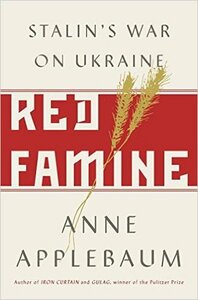Take a photo of a barcode or cover
Excellent book. Detailed, devastating. This helped me understand a bit better the context of the Russian invasion of Ukraine and the deep history of entanglement and violence between the two. Applebaum's writing is clear and powerful. This goes on the shelf with histories of other human-made famines (Ireland, for example). It was especially interesting to read about Rafael Lemkin and his crafting of the term "genocide." In part, the Holodomor--the Ukrainian term for this genocide--doesn't qualify under the current definition because the USSR knew it would be held responsible and made sure that the famine wouldn't qualify. As Applebaum notes, not that this makes a huge difference in the end. Crimes against humanity are just as serious and fit the sequence of events. I was especially interested in the chapter entitled "The Holodomor in History and Memory." This chapter details how the evidence of the famine was systematically suppressed for decades. Yet the Ukrainian people secretly kept records and passed on their memories; and once various archives opened, the systemic nature of the famine became all too clear.
Outstanding work. Definitive and devastating book on the Holodomor. A must-read for anyone interested in human rights, the power of propaganda, and genocide.
This was just an okay read to me.
I found it one-hundred-percent history, which I am not a huge fan of, myself.
It still was a good read, and especially a timely read.
3.0/5
I found it one-hundred-percent history, which I am not a huge fan of, myself.
It still was a good read, and especially a timely read.
3.0/5
dark
informative
reflective
medium-paced
I really loved the authors work on the Gulags but didn't find this one as enthralling. It felt like it could have gone deeper into the history and was maybe a bit repetitive. But, great subject. It fills in more about that style of Russian forced compliance that I am familiar with from the Mennonite and Jewish histories I read about the same time periods and earlier.
challenging
dark
emotional
hopeful
informative
reflective
sad
tense
slow-paced
When I started this book I tried several times and I could not get into it. Maybe it was more based on my mood at the time because when I returned to it a year later I could not put it down.
Applebaum makes a strong argument that Stalin intentionally starved peasants in an attempt to destroy Ukrainian nationalism (though peasants were starved in other regions of Soviet Union as well). This book provides historical context to the war in Ukraine today and began to fill a large gap of knowledge in my understanding of 20th century history -- especially Ukrainian identity/Ukrainian nationalism.
Applebaum makes a strong argument that Stalin intentionally starved peasants in an attempt to destroy Ukrainian nationalism (though peasants were starved in other regions of Soviet Union as well). This book provides historical context to the war in Ukraine today and began to fill a large gap of knowledge in my understanding of 20th century history -- especially Ukrainian identity/Ukrainian nationalism.
informative
slow-paced
dark
emotional
informative
tense
slow-paced
informative
sad
slow-paced






